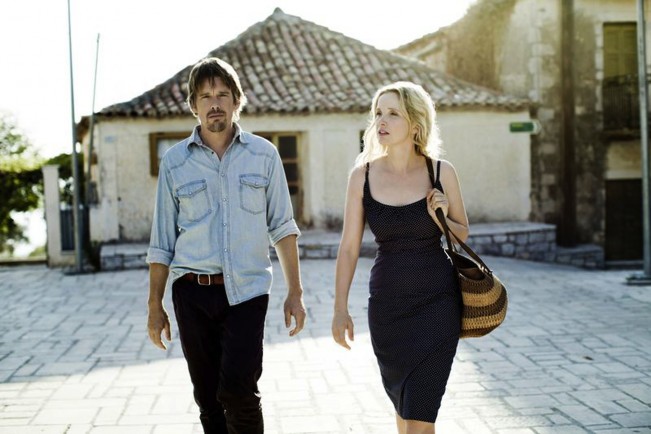By Jake Howell jake.howell@utoronto.ca
Sundance Review: Before Midnight
Before Midnight, the third installment of Richard Linklater, Ethan Hawke and Julie Delpy’s “Before” series (after 1995’s Before Sunrise and 2004’s Before Sunset), reunites us with one of cinema’s most-beloved romances: Jesse (Ethan Hawke) and Celine (Julie Delpy). Fans of the star-crossed lovers are dying to know: what has happened over the past nine years? What follows Sunset’s unforgettable ending?
(“Baby, you are going to miss that plane.”)
(“I know.”)
Before Midnight finds Jesse and Celine in sun-kissed Greece, each in their forties with emotional baggage in tow. And it’s perfect.
Like Midnight’s predecessors, the movie exists less as a narrative and more as a string of conversations that take place over a single 24-hour span: over the dinner table, in the bedroom, or in the car. While nothing truly happens in Before Midnight, we can see that much has happened since Before Sunset, allowing the incredible writing to take over and fill in the narrative gap. Indeed, this is a script for the ages: the seamless dialogue (penned again by Linklater, Delpy, and Hawke) flows freely and without hiccups, putting to shame what you once thought was believable speech in movies. This is more voyeurism than acting and writing.
The script is realized primarily with Linklater’s trademark Steadicam, framing in long takes the characters as they wander through lush European locales. These extended shots will remind you why you love film, as Linklater treats everyone involved with the utmost respect: our hands aren’t held (there aren’t even subtitles) and the actors are given plenty of screen time to breathe and do their jobs. In other words, excessive editing is eschewed while a flawless cast performs an unbeatable script. It’s a simple formula, but one that is often neglected or ruined by the poor artistic decisions of lesser filmmakers. Not so, here. The dials have been tuned to just the right frequency. There is nothing to be changed.
While the supporting players do a wonderful job adding in some welcome comic relief, the chemistry between Delpy and Hawke is something to revere; something to place in a glass case and marvel at in museums. These are career-best performances. Their honed chemistry—alongside their wizened perspectives on life as a fortysomething—makes Before Midnight the funniest of the trilogy. Eighteen years can change a lot about a relationship dynamic, and Linklater finds himself with ample comedy to mine from: the many differences between men and women, middle-aged sexuality, and what being in love actually means. But there’s trouble in Paradise, as Celine and Jesse each have personal struggles and external forces weighing them down and pulling them in opposite directions. This places an immense strain on their connection, perhaps forcing an inevitable, unwanted compromise. Make no mistake: this is still a romantic drama.
With each film in this series, Richard Linklater has given us a day-in-the-life snapshot of two lovers. As a result, this approach has painted a deeper portrait of the characters that Hawke, Delpy, and Linklater have crafted over the years: how they’ve grown physically, how they’ve matured romantically, and how they see the world differently. When you add Before Midnight to the two existing films, the result is a breathtaking trilogy that not only tracks this fabled love over nearly 20 years, but without really intending to, also manages to showcase the passing of time in a beautiful, staggering way. Of course, given how many years have passed over the creation of these movies, there exists the undeniable novelty in viewing the trilogy in order; observing in a few hours both an evolution in film production (the aesthetic leap between the 1990s and the 2010s is remarkable) and the aging of two very fine actors. While that is certainly something to look forward to, the following should be made clear: Before Midnight is a film that is good enough to stand on its own as a peek into the highs and lows of love. As such, it is a masterpiece that is made even better when viewed with the proper context. This is not simply the cherry on top of Before Sunrise and Before Sunset—it is its own cake entirely.
And it’s perfect.

















Outstanding to hear. I can’t wait for this. Linklater remains a relatively unsung hero in American cinema, but this series could be what makes his name resonate with future generations. Well, this and Dazed and Confused, naturally.
Well said, Keil.
Thanks. I’m a 34-year-old cinephile, born and raised in Texas, so he holds a special place in my heart. Regardless of locale, however, he’s a remarkable talent who has always seemed like a genuinely kind person and lifelong film buff. And, of course, the films speak for themselves. While they’re not all masterpieces, nearly all of them are bright spots in an often dismal cinematic landscape.
Just consider these titles for a bit:
– Slacker
– Dazed and Confused
– Before Sunrise
– Suburbia
– Waking Life
– Tape
– School of Rock
– Before Sunset
– A Scanner Darkly
– Bernie
Bernie’s shamefully non-existent marketing last year and its eventual appearance on various awards shows and Top 10 lists is a perfect representation of the lack of respect for Linklater’s work, despite its painfully obvious quality.